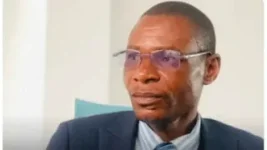Tonderai Mugabe tried to get money from the estate of late President Robert Mugabe. He said he was Mugabe's secret son. The case ended in the High Court in Harare last week.
Tonderai wanted to reopen Mugabe's estate and have the court name him an heir. He withdrew his claim in court and agreed to pay the estate's legal costs.
Bona Mugabe, the former president's daughter, was the executor of the estate. She was named as the respondent in the civil suit. Justice Tawanda Chitapi heard the case.
Tonderai did not challenge the Master of the High Court's decision in time. He had 6 weeks to do this, but because he missed the deadline, he could no longer make the claim.
Tonderai's lawyer, Mr. T.M. Zenda, wanted Bona Mugabe to give him Mugabe's death certificate. He said she could be in contempt of court if she refused.
Bona Mugabe's lawyer, Mr. Addington Chinake, argued against Tonderai's case. He said it had many problems in law and fact.
Justice Chitapi agreed that the evidence was weak. He said Tonderai using the Mugabe name did not make him Mugabe's son.
Mr. Chinake said the case had fatal flaws, and the court could not consider the application.
Faced with losing, Mr. Zenda asked for a short break. He spoke with Tonderai. They decided to withdraw the case and pay the legal costs.
Justice Chitapi accepted this. He said the case could not be fixed.
Mr. Chinake said Mugabe's estate was already settled and paid out. The law protects executors from claims after this happens.
Tonderai's DNA results and birth certificate were not enough proof under the law. Justice Chitapi said this evidence was not credible or valuable.
Tonderai claimed he was born in 1977 in Mozambique. He said his mother was Mugabe's lover during the war. He said she hid this because she feared Mugabe's wife Sally.
But Tonderai's case was very weak. Justice Chitapi's questions showed the problems.
The ruling upheld the final payment of the estate and protected the executor from late challenges. Tonderai's claim for recognition failed, so he had to withdraw it.
Tonderai wanted to reopen Mugabe's estate and have the court name him an heir. He withdrew his claim in court and agreed to pay the estate's legal costs.
Bona Mugabe, the former president's daughter, was the executor of the estate. She was named as the respondent in the civil suit. Justice Tawanda Chitapi heard the case.
Tonderai did not challenge the Master of the High Court's decision in time. He had 6 weeks to do this, but because he missed the deadline, he could no longer make the claim.
Tonderai's lawyer, Mr. T.M. Zenda, wanted Bona Mugabe to give him Mugabe's death certificate. He said she could be in contempt of court if she refused.
Bona Mugabe's lawyer, Mr. Addington Chinake, argued against Tonderai's case. He said it had many problems in law and fact.
Justice Chitapi agreed that the evidence was weak. He said Tonderai using the Mugabe name did not make him Mugabe's son.
Mr. Chinake said the case had fatal flaws, and the court could not consider the application.
Faced with losing, Mr. Zenda asked for a short break. He spoke with Tonderai. They decided to withdraw the case and pay the legal costs.
Justice Chitapi accepted this. He said the case could not be fixed.
Mr. Chinake said Mugabe's estate was already settled and paid out. The law protects executors from claims after this happens.
Tonderai's DNA results and birth certificate were not enough proof under the law. Justice Chitapi said this evidence was not credible or valuable.
Tonderai claimed he was born in 1977 in Mozambique. He said his mother was Mugabe's lover during the war. He said she hid this because she feared Mugabe's wife Sally.
But Tonderai's case was very weak. Justice Chitapi's questions showed the problems.
The ruling upheld the final payment of the estate and protected the executor from late challenges. Tonderai's claim for recognition failed, so he had to withdraw it.












